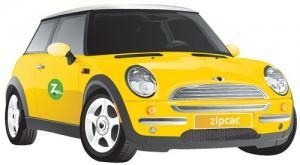 When it comes to promoting sustainability in transportation, there’s usually one answer that isn’t: the car. While it’s true that it would be ideal if we could get everyone biking Copenhagen-style, or if every place had an extensive subway and bus network, the truth is, people are slow to pick up biking and many locations–the suburbs, in particular–are far from having robust alternative transportation networks. Like it or not, the car is here to stay. But the more innovative we get when it comes to the automobile, the better chance we might have at promoting sustainable transportation.
When it comes to promoting sustainability in transportation, there’s usually one answer that isn’t: the car. While it’s true that it would be ideal if we could get everyone biking Copenhagen-style, or if every place had an extensive subway and bus network, the truth is, people are slow to pick up biking and many locations–the suburbs, in particular–are far from having robust alternative transportation networks. Like it or not, the car is here to stay. But the more innovative we get when it comes to the automobile, the better chance we might have at promoting sustainable transportation.
Study after study shows that millennials are choosing to eschew cars, opting instead for two wheeled transportation or to live in cities with buses and trains. I am one of said millennials, having lived car free since 2007 thanks to my bike, the DC Metro, the Bay Area’s BART and AC Transit, and Zipcar.
Love as I might my bike, I often find myself in the passenger or front seat of a car, whether it’s to run errands, see family or go camping or hiking. Many millennial’s likely also find themselves in the same position, and might reluctantly find their way to 4 wheeled, private occupancy car (gulp) ownership. But I want that car to always be premised on car-sharing.
An interesting idea that was just launched by BMW is the car that comes with car-sharing. That is, if you buy the new BMW i3, their new electric vehicle, you get access to a full-sized SUV for several weeks a year. The rational being, you don’t really need a car that can take you to the mountains when you’re just picking up eggs and milk at the supermarket. With their new scheme, you can hop in your small, cheap to operate electric vehicle for the milk trips and have access to an SUV for when you actually need the horsepower and room it provides. BMW’s car with car-sharing is an answer that recognizes that when car-free ceases to be answer, owning a car can be a rational, environmentally friendly choice.
Kinda.
The problem I have with the car-share bundle concept is that car ownership ultimately means driving. Jevons Paradox is the idea that we do more of something environmentally sound (driving an electric vehicle, for example) when to do so is no longer bad, thus offsetting the potential gain. That, coupled with the “I may as well drive” phenomenon that car ownership seems to produce and, well, suddenly that walk to the grocery store can be accomplished by car and it’s faster too, so why not? There needs to be a way that, recognizing the utility of the car, to encourage e-friendly driving without also encouraging surplus driving.
What makes Zipcar great is that it makes you think before you take the trip. Is this worth the hourly rate? Do I really need to run this errand in a car? But it’s unfortunately a bit more complicated than that. When you buy a car, it’s a sunk cost. An extra hour of driving, sure it’s gas, but you’ve already invested in the car, so why not? You don’t feel it as strongly as you do, when, say, it’s an extra $11.50 to run to Costco and Target. Showing the true cost of an item is a great way to, wait for it, dissuade behavior. And, I’d argue this is Zipcar’s big problem: after many $11.50 charges to get zip-lock bags, suddenly owning a car seems like a better answer. You may as well.
Recognizing that many people will at some point likely feel compelled to “give in” and get a car, there needs be a car-sharing model that tethers the line between over-encouraging driving and driving. BMW’s car plus car-sharing– even if it may be the lesser of two evils– is still not the answer because it ultimately encourages driving. I think it would be great to see a car-sharing model that is a tiered system, like bronze, silver and gold, where a set price for each level gets you a certain amount of hours behind the wheel. It means more driving, yes, but it’s still less than would happen with single car ownership, and thus ultimately keeps people off the road. Plus if Zipcars are hybrids or electric vehicles, the benefits are extended further.
I genuinely hope I never own a car again (and you would too if you grew up in the sprawling LA suburbs). If we can improve the car-sharing model just a little bit, I may never need to.




